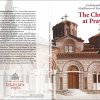University of Wisconsin-Madison
1452 Van Hise
1220 Linden Dr
Madison, WI 53706
608-262-4311
This email address is being protected from spambots. You need JavaScript enabled to view it.
Born and raised in Belgrade, Longinovic holds degrees in creative writing, psychology and has his Ph.D in comparative literature.
His books include Borderline Culture (1993), Vampires Like Us (2005), the co-edited and co-translated volume, with Daniel Weissbort: Red Knight: Serbian Women Songs (1992), and the edited volume: David Albahari, Words are Something Else (1996). He is also the author of several works of fiction, both in Serbian (Sama Amerika, 1995) and English (Moment of Silence, 1990).
His most recent book, Vampire Nation: Violence as Cultural Imaginary, was published by Duke University Press in 2011. His research interests include South Slavic literatures and cultures; the Serbian language; literary theory; Central and East European literary history; comparative Slavic studies, translation studies, and cultural studies.
.Education:
Ph. D., 1990, University of Iowa, Comparative Literature Program
Dissertation: "The Improbable Universe: Ideology, Identity and Borderline Poetics in the Twentieth Century Slavic Novel," Daniel Weissbort, supervisor
M. F. A., 1984, University of Iowa, Department of English (Creative Writing)
Thesis: "Moment of Silence," James A. McPherson, supervisor
B. A., 1981, University of Belgrade (Yugoslavia), Faculty of Philosophy (Clinical Psychology)
Thesis: "The Impact of Psychedelic Research on Identity Theory and Therapy,"
Dr. Josip Berger, supervisor
Study Abroad Programs:
Oxford Academy of English, Oxford, England, Summer (1972-1973)
Positions held and offered:
2008-2011 Chair, Slavic Languages and Literatures, UW-Madison
2005-present Resident Director, UW-Madison International Seminar
(Rovinj, Croatia)
2003 Visiting Professor, Central European University (Anthropology, course on Violence and Culture)
2001-present Professor of Slavic and Comparative Literature,
(U of Wisconsin-Madison)
2001 Visiting Professor, Harvard University (Slavic Department)
Fall 2000 Chair, Slavic Languages, UW-Madison
1999-2000 Visiting Professor, Central European University (Budapest), Gender Studies Program
1999-2001 Director, The Cultural Translation Project
(Global Studies, UW-Madison)
1999 Director, International Writing Program, University of Iowa (position declined)
1997-99 Associate Chair, Slavic Languages,
UW-Madison
1996- 2001 Associate Professor, UW-Madison
1990- 1996 Assistant Professor, UW-Madison
1988-1989 Translation Coordinator, University of Iowa,
International Writing Program (USIA)
1984-1987 Teaching Assistant, University of Iowa,
General Education in Literature Program
1983 Research Assistant, University of Iowa, Creative Writing Program
Honors and awards:
Hilldale Faculty-Undergraduate Research Fellowship, 2008
Mellon Foundation, "Post-Human" (UW-Madison), 2008-2009
Mellon Foundation, "Monstrosity and Alterity" (UW-Madison), 2006-2007
Vilas Associate, UW-Madison (1999-2000)
Ford Foundation, "Legacies of Authoritarianism," Research Circle Startup Grant
Ford Foundation, "Media, Performance, Identity," Research Circle Startup Grant, 1998/99
Canada Council, Literary History Project Grant, (University of Toronto), 1996-2000
IREX Short-Term Travel Grant, 1995. (FR Yugoslavia)
Fellow, Institute for Research in the Humanties, UW-Madison, 1995
Global Cultures Course Development Award, UW-Madison, 1994
Graduate School Research Committee, UW-Madison, Summer Research Grant: 1993, 1994, 1997, 1998, 1999, 2001, 2002, 2003, 2004, 2005, 2006, 2008, 2008, 2009.
Hilldale Faculty-Undergraduate Research Fellowship, 1991, 2008
Best Literary Contribution in Yugoslavia, 1990
Writing Fellow, International Writing Program, University of Iowa, 1982
Professional activity:
Editor-in Chief, Serbian Literary Research (refereed academic journal), Novi Sad, (Serbia)
Academic Board Member, Ohrid State University (Macedonia) (2003-2008)
Academic Board Member, Banja Luka Communications College (Bosnia-Herzegovina) (2001-present)
PMLA Advisory Committee, 1998-2000,
Reader for: The Comparatist, Northwestern University Press, Penn State University Press, Central European University Press, Harcourt Brace Jovanovich, Peter Lang's "Balkan Series," Stanford University Press, PMLA, Slavic and East European Journal, Slavic Review, Journal of Popular Culture.
Member: MLA, AAASS, NASSS, ACLA, ICLA, M/MLA, AWP, Phi Beta Delta.
Не дирајте Булгакова
Професор Универзитета у Медисону Томислав З. Лонгиновић, аутор је студије која обједињује словенски културни простор
Словени, који су стално доживљавали ломове идентитета, никада нису једнаки сами себи, међутим писци кроз стваралачки акт реафирмишу јединствени културни словенски простор, каже Томислав З. Лонгиновић, професор на Одсеку за славистику и упоредну књижевност на Универзитету у Медисону, аутор књиге „Гранична култура, политика идентитета у четири словенска романа 20. века. Ово дело, које се код нас објављује двадесет година после америчког издања, објавио је „Службени гласник”, у преводу Дијане Митровић-Лонгиновић.
Аутор подробно анализира дела „Мајстор и Маргарита” Михаила Булгакова, „Фердидурке” Витолда Гомбровича, „Гробница за Бориса Давидовича” Данила Киша и „Живот је другде” Милана Кундере. Томислав З. Лонгиновић разматра ове књиге кроз идеју о јединственом културном идентитету средње и источне Европе, у оквиру које ниче гранична поетика. „Гранична поетика непрекидно преиспитује границе идентитета и идеологије, стварајући прозу која испитује мрачну одбојну страну историје, која је покренута супротстављањем појединца институционалним моћима”, пише аутор.
– Писци који су ушли у фокус мог интересовања „испали су из канона”, били су трн у оку политике и власти, док је њихово дисидентство било посебне врсте. Наиме, они се нису борили са званичним дискурсом, писали су због слободе. То је „трећи пут” у одбрани аутономности и слободе, право да се буде различит. Желео сам да понудим верзију постполитичког ангажмана у читању ових аутора, дефинишући словенску културу као граничну. Мој метод је психополитички, и то је начин одређења места књижевности у политичком дискурсу. Могао сам у овај избор да уврстим Солжењицина или Добрицу Ћосића, међутим они не спадају у овај код – објаснио је професор Лонгиновић.
Међутим, писци о којима се у овој студији разматра имају различите ставове према тотализму, идеологији, егзилу. Томислав З. Лонгиновић наводи пример Булгакова који никада није емигрирао, живео је пре у некој врсти унутрашњег егзила, писао је „Мајстора и Маргариту”, претпостављајући да ће рукопис остати у фиоци, знао је да та књига не може да буде објављена.
– Булгаков није био дисидент у класичном смислу те речи, због тога што га је Стаљин волео. Због драме „Дани Турбинових” Булгакову је стално претио гулаг, међутим сам Стаљин га је заштитио и рекао: „Не дирајте Булгакова”, сматрајући да је писац поштен у свом противљењу одређеним девијацијама у Совјетском друштву двадесетих и тридесетих година 20. века. Можемо да кажемо да је Гомбрович „најдемонскији” од свих наведених писаца, његов став био је противљење. Био је против комунизма, нацизма, а био је инспирисан својом хомосексуалношћу, својом сексуалном различитошћу, ствари је увек видео релативизовано са те своје позиције у егзилу, прво у Аргентини, а затим у Француској. Био је најрадикалнији у личном односу писца према друштву – објашњава Лонгиновић за наш лист, додајући:
– Наш Данило Киш, пак, није силом прилика постао дисидент. Он је у Француску отишао по свом нахођењу, а добио је све судске процесе који су се овде против њега водили, дакле успео је политички да се избори против својих противника. И случај Милана Куднере врло је занимљив, он јесте био нека врста класичног дисидента, јесте живео у Француској и после промена у Чехословачкој више тамо није хтео да се врати, чак више није писао на чешком. Појам граничног идентитета, ломови идентитета, прелазак из једног језика у други, прелазак из једне земље у другу, то је оно што мене занима.
Књига „Гранична култура” писана је тако да буде разумљива читалачкој публици у САД, која тек треба да се упозна са словенском културом. Због тога је ауторка превода на српски језик имала задатак да појединим стварима да префињеније финесе, да превод уклопи у променљиве финесе проблема идентитета.
По речима професора Лонгиновића, у Америци се словенска култура поистовећује са руском, и то је проблем мањих словенских култура, пољске, чешке, српске, што се дешава још од краја осамдесетих. „Можда је још једини од последњих одсека у Америци на којем се предају ове четири словенске књижевности и језици управо Одсек за славистику и упоредну књижевност на Универзитету ’Висконсин’ у Медисону. Сама литература и издаваштво у великој су кризи у САД, због тога што мало људи купује књиге, најпре због ’сајбер-револуције’ и доступности књига на интернету. Ту и тамо се пробију писци за које увек постоји занимање из нашег дела света. Недавно је објављена нова биографија Данила Киша од Марка Томпсона, која има добар пријем”, истиче Лонгиновић.
Наш саговорник аутор је и књиге „Вампирска нација: насиље као културна имагинација”, која је 2011. године награђена у Америци као најбоља студија у оквиру јужнословенских студија. У овом делу, Лонгиновић разматра начин на који је мотив вампира коришћен за формирање представа о Балкану кроз историју.
Марина Вулићевић
Политика, 17. 5. 2013.






